Home » Jazz Articles » Bailey's Bundles » Ten Artists: March 2019
Ten Artists: March 2019
 Kristina Koller
Kristina Koller At The Poli Club
Self Produced
2019
New York City vocalist Kristina Koller follows up her debut recording, Perception (Self Produced, 2017), with this four-song, extended play live recording. Koller is backed by Fima Chupakhin on piano, Ben Rubens on bass and Darrian Douglas on drums. Their support deepens the organic flavor of Koller's sturdy and expressive voice. After Koller and company deliver a solid "Save Your Love for Me," the group assembles an impressionist performance of the Rodgers and Hart piece "Falling in Love with Love." Chupakhin's solo is lengthy and expressive and Koller's delivery precise on the dot. The quartet delivers the goods on the two remaining pieces, "I Didn't Know About You" and "What a Difference a Day Makes."
Koller possesses a robust confidence in her singing, which could be considered casual expression that lesser talents could not pull off with all the practice in the world. This lends her voice a sexy, relaxed, and intense edge while she makes it all look and sound easy. Her stage presence is potent and assertive, brimming with that same robust confidence. Jazz is meant to be performed live and this brief recording expresses why. So, okay, these four songs are a provocative taste. Please consider expanding into a full CD release. Kristina Koller, you are worth it.
 Cyrille Aimée
Cyrille Aimée Move On: A Sondheim Adventure
Mack Avenue Records
2019
Vocalist Cyrille Aimée should be enjoying the same attention and adulation as Cecile McLorin Salvant. Aimée is every bit as progressive, if not more (but that is absolutely not a knock to that great singer, only the recognition by reportage). Aimée's last two recordings, Cyrille Aimée -Live (Mack Avenue, 2018) and Let's Get Lost (Mack Avenue, 2016) amply demonstrate a singer with a firm grasp of her art, how to arrange it, and how to deliver it. She has disbanded the fine band that accompanied her on Live, an unusual group employing a pair of guitarists as the harmony instruments. Aimée claimed that it was time to move on. And move on, she has.
Move On: A Sondheim Adventure finds the singer with a French trio of pianist Thomas Enhco, bassist Jérémey Bruyère, and drummer Yoann Serra. Add Brazilian guitarist Diego Figueiredo and additional piano by Assaf Gleizner and Aimée's brilliant production becomes clear. Her performance smacks of the same brilliance, beginning with her looped a capella treatment of "When I Get Famous." Aimée insists that Stephen Sondheim's compositions were made for jazz, but full-scale projects dedicated to them are few, with a notable recent recording being Cheryl Bentyne's Rearrangements of Shadows: The Music of Stephen Sondheim (Artist Share, 2017). Aimée infuses Sondheim's music with every flavor of her newly adopted hometown, New Orleans. "Take Me To the World" is a cross of Afro-Cuban with Dixieland while "Loving You" makes me wonder how the singer has avoided Broadway. "Being Alive" features a string quartet bringing a measured Old World charm to the song, with carefully arranged horns added for a full sonic effect and retaining the Latin undercurrent passing through the entire recording. There will be no stopping Cyrille Aimée—not that anyone would dare.
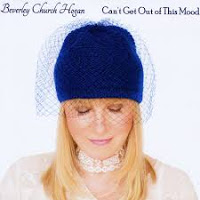 Beverley Church Hogan
Beverley Church Hogan Can't Get Out of This Mood
Cafe Pacific Records
2018
It is better late than never. After 60 years, Beverley Church Hogan has finally made her debut recording. Then again, who's counting? Hogan was initially drawn to music but opted for a more traditional life, lived fully and expansively, before returning to music in the early 2000s, For the past decade, Hogan has been performing with pianist John Proulx at several West Coast venues. This lengthy relationship prepared them both to make Can't Get Out of This Mood. Proulx is proving to be an exceptional arranger and producer, providing both functions on Hogan's recording as well as chairing the piano duties. Regarding arrangements, Proulx opts for the understated. That does not mean the simple or unadorned. The arrangements are adorned with a sophistication and balance well suited for Hogan's experienced vocal style. Hogan's song choice also shows her experience in selecting "standards" intelligently. Only "Speak Low" and "Time After Time" would be considered the canonical center of the recording, with pieces like Stephen Sondheim's "Losing My Mind" and Cas Caswell's "I Know You by Heart" orbiting that center. Hogan transforms Rene Marie's exceptional "Take My Breath Away" into a lilting bossa nova accentuated by flute and Proulx's light touch. Hogan proves that it is never too late to achieve one's goals and to achieve them with authority and grace.
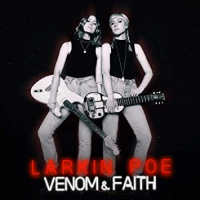 Larkin Poe
Larkin Poe Venon & Faith
Tricki-Woo Records
2018
My, are we not lightyears away from the lonesome high-tenor bluegrass where these two young women came from? Megan and Rebecca Lovell were two-thirds (with older sister Jessica) of the Lovell Sisters, an acoustic ensemble with roots in bluegrass and classical music but best defined as "progressive acoustic music" (like Chris Thile and The Punch Brothers). Jessica left Megan and Rebecca for them to become Larkin Poe. As Larkin Poe, the sisters typically perform as a duo or as a quartet with bass and drums. Their music is stripped down, lean, and muscular. Rebecca's guitar playing is precise and accurate. Megan's lap steel guitar is expansive and emotive. The pair have been recording together as Larkin Poe since 2010, releasing five EPs and four full recordings. The duo's earlier recordings revealed a keen pop identify that solidified into a dense blues-rock sensibility on Peach (Tricki-Woo Records, 2017). On Venom and Faith the sisters mix things up with a hard rhythm, gospel-rap vibe on "Sometimes," their personal brand of rock call-and-response in "Bleach Blonde Bottle Blues," reimagined Bentonia Blues for "Hard Time Killing Floor Blues," and a hoodoo stomp called "Mississippi" featuring Tyler Bryant on slide guitar. The sisters are carefully honing their sound into a unique amalgam of the past 80 years of American music, and it has never sounded so good.
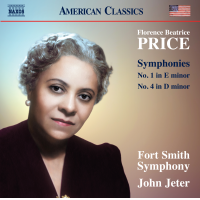 The Fort Smith Symphony, John Jeter
The Fort Smith Symphony, John Jeter Florence Price: Symphonies 1 & 4
Naxos American Classics
2019
Little Rock, Arkansas is an unlikely place to have given birth to or hosted classical music composers. That being said, the small Southern city has not one but two classical composers to its credit. William Grant Still (1895 -1978) was born in Woodville, Mississippi and grew up in Little Rock. He went on to be known as "the Dean" of African American composers and is most notable for his first symphony, the "Afro-American." Florence Price (1887 -1953) was born in Little Rock, later relocating to Chicago, where she became the first African American woman to have a composition performed by a major orchestra. In 1933, the Chicago Symphony Orchestra presented the world premiere of Price's Symphony No. 1 in E Minor. Composed in 1945, Price's Symphony No. 4 in D Minor sees its premiere on this recording by the Fort Smith Symphony under the direction of John Jeter, along with a performance of the Symphony No. 1.
Price's manuscript of her Symphony No. 4 was found among nearly 30 boxes of papers in what turned out to be Price's abandoned summer home in Chicago. Price's symphonies sound undeniably "American" in the same way as Dvorak's "New World Symphony" or works by Aaron Copland and Elmer Bernstein. In both of her symphonies, Price scores the scherzo movement with a syncopated "Juba Dance," a folk tradition that originated in Angola and moved with the slaves to American plantations. These movements are arresting in their unusual beauty and radiant performance. The Symphony No. 4 incorporates the spiritual "Wade In The Water" as a motif throughout the first movement. Price's orchestrations are bright but conservative, and her melodies are refreshing. Kudos to the Fort Smith Symphony for such fine performances.
 Alan Feinberg
Alan Feinberg Basically Bull
Steinway & Sons
2013
I am throwing in a bit of an old one here because the keyboard music of British Renaissance composer John Bull (1562 -1628) is so appealing as an antecedent to that of Bach and Scarlatti. There is only a small amount of Bull keyboard music available (though the label Musica Omnia presently sports Bull: Complete Works for Keyboard, Vol. 1 (2009) with no apparent follow-up). Bull's music is typically played on the harpsichord or virginal, but pianist Alan Feinberg makes a grand argument for the modern piano on his excellent Basically Bull.
For those listeners saturated with Bach, Scarlatti, Couperin, and the like, Bull is a breath of fresh aire. His compositions bear names like "A Sad Pavan for These Distracted Times" and "Bull's Goodnight." These pieces are similar to those of Bull's contemporary John Dowland (1563 -1626), in that the work of each is emotive and melancholy. Most of the pieces are in a slow, contemplative tempo. This music is incredibly easy to listen to and enjoy. It is structured yet nuanced in such a way that it demands attention without imposing, instead drawing the listener into a comfortable—if slightly dark—place. Feinberg's recording is a good addition to a disc of similar music by Glenn Gould, Consort of Musicke by William Byrd & Orlando Gibbons; Sweelinck: Fantasia in D (Sony Classical, 1993).
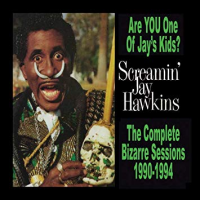 Screamin' Jay Hawkins
Screamin' Jay Hawkins Are YOU One of Jay's Kids? -The Complete Bizarre Sessions -1990 -1994
Omnivore
2018
There are some things so right as to be ironic. Ur-rock 'n' roller Screamin' Jay Hawkins (of "I Put a Spell on You" fame) recording for a record label called "Bizarre" is such a thing. Hawkins existed in the shade for much of his career in the '70s and '80s, finding himself in the early '90s sans recognition or a record contract. Bizarre Records founder Robert Duffey "discovered" Hawkins at a bar and signed the singer to his label, where he would record three albums over four years, the cream of which is released here on Are YOU One of Jay's Kids? -The Complete Bizarre Sessions -1990 -1994. What results is a unique updating of Hawkins's signature sound with interesting programing. On Bizarre's Black Music For White People (1991), Hawkins reinfuses the essence of Tom Waits on remakes of "Heart Attack And Vine" and "Ice Cream Man," with his own special juju, as well as re-addressing Louis Jordan's "Is You Is Or Is You Ain't My Baby" and Smiley Lewis's "I Hear You Knockin.'" Stone Crazy (1993) revealed the blues in Hawkins with covers of Howlin' Wolf's "Who's Been Talkin,'" Willie Mabon's "I Don't Know," and Ray Charles's "I Believe To My Soul." On these pieces, Hawkins becomes a Jerry Lee Lewis-stylist, making the songs his own. On his last Bizarre recording, Somethin' Funny Goin' On (1994(, Hawkins yucks things up with Tom Wait's "Whistling Past the Graveyard" and Duffey's own "I Am The Cool." Are YOU One of Jay's Kids? is a fallback going forward.
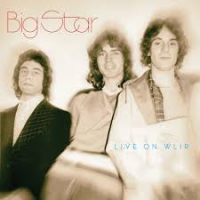 Big Star
Big Star Live on WLIR
Omnivore
2019
I believe that Memphis, Tennessee's Big Star may be the most underrated band to be as important as it was. Founded in 1971 by Alex Chilton, Chris Bell, Jody Stephens, and Andy Hummel, the band's style reflected The Beatles, The Rolling Stones, and The Byrds. That said, Big Star made its mark going forward by being the forefather of the alternative rock music of the '80s. The band was capable of the most hook-laden pop songs. Chronologically speaking, Big Star recorded their second album Radio City (Ardent, 1974) as a trio, after the departure of founding member Chris Bell. When it came time to tour, original bassist Andy Hummel decided to return to school to pursue an engineering degree. With this departure, Alex Chilton and Jody Stephens recruited fellow Memphis native John Lightman to take over on bass duties, and the band readied the present live set. Live on WLIR was recorded in the Ultrasonic Studios on Long Island in 1974.
For a band whose visage was best experienced in the studio, Big Star is capable of organically loose and powerful music. This sound is termed "Power Pop," music that resulted from the evolutionary stream coupling The Beatles's melodic approach with Pete Townshend's slash-and-burn guitar method. The recital repertoire consisted of songs from Radio City and the band's first recording, Number 1 Record (Ardent, 1972). Chief among these songs are "September Gurls," "Thirteen," and "In the Street" (the theme song for That '70s Show). This music is indeed exceptional. So, why was this band not better known nationally? Inept distribution is one reason, as is the regional gravity of the Memphis area, which seemed to keep its homegrown talent close, and John Chilton's mercurial nature (see Robert Gordon's Memphis Rent Party: The Blues, Rock & Soul In Music's Hometown [Bloomsbury, 2019] for several view of the Chilton mythos). Omnivore Records is reaching deep into the Big Star-Alex Chilton-Chris Bell world and we will all be better for it.
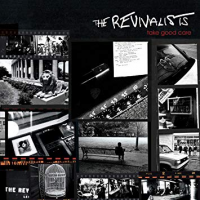 The Revivalists
The Revivalists Take Good Care
Loma Vista Records
2018
Hailing from New Orleans, The Revivalists are a band of surprises. Outside of the fertile musical soil from which the band springs, little else will reveal their NOLA roots. They are a band of contradictions: a pedal steel guitar alongside horns and an intricate realized guitar, all playing music that is removed from time out of mind. After releasing Vital Signs (Self Produced, 2010) and City of Sound (Wind Up, 2014), the band released Men Amongst Mountains (Wind Up, 2015), their "break-out" recording that brought them much needed exposure. That recording is full of anthemic vigor and songs with lyrics threatening to spin out into millennial poetic nonsense if not for David Shaw's exceptional rock voice.
With Take Good Care, an interesting thing happened on social media. A percentage of otherwise stalwart fans dissed the band for having "sold out" their "signature sound." That is, of course, absurd. The band has obviously evolved in a wholly adequate and fulfilling direction. The band's sound has taken on a rich density that fills all corners sonically. "Otherside Of Paradise" features some forward thinking background vocals, while "All My Friends" finds the album's title cleverly buried in the chorus. "Got Love" is what happens to soul music when is straddles two centuries, and "You and I" is what happens to reggae when assimilated into American pop culture. Take Good Care is a solid step forward for The Revivalists.
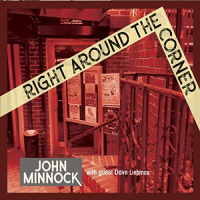 John Minnock
John Minnock Right Around the Corner
Self Produced
2018
John Minnock brings a much needed extroverted edge to jazz vocals. Part of that edge is his progressive repertoire, which includes Grace Jones, Billy Joel, and Sam Smith. Another part of that edge is the exuberance with which he sings his up-tempo pieces, evidenced on the title song of Right Around The Corner, which is twenty-first century gritty urban, and his cosmic cover of Jay Bannon's "New York, New York" (not the Sinatra standard). Featuring David Liebman's ever-expressive soprano saxophone, Minnock delivers the song with a muscular assertiveness, the two artists sparring on this jagged-edged performance. This is forward thinking.
What makes the disc special are the dramatically reworked standards. "Get Happy" is as impressionistic as a watercolor fading in the rain. "Moon River" is delivered with a samba beat featuring guitarist Tony DePaolo. "You Don't Know What Love Is" is delivered in a halted, pensive manner as a duet with pianist Enrique Haneine. David Liebman introduces an almost ragged "Skylark" until Minnock starts and all is smooth, with just of hint of anxiety from Liebman's horn in counterpoint to the singer's more conservative approach. Right Around the Corner is a welcome addition to male jazz vocals, a subgenre in need of greater membership like this.
< Previous
Bone Code
Next >
Near Disaster
Comments
Tags
Bailey's Bundles
Cyrille Aimee
C. Michael Bailey
Kristina Koller
Cecile McLorin Salvant
Thomas Enhco
Jérémey Bruyère
Assaf Gleizner
Cheryl Bentyne
Beverley Church Hogan
John Proulx
Concerts
For the Love of Jazz
 All About Jazz has been a pillar of jazz since 1995, championing it as an art form and, more importantly, supporting the musicians who create it. Our enduring commitment has made "AAJ" one of the most culturally important websites of its kind, read by hundreds of thousands of fans, musicians and industry figures every month.
All About Jazz has been a pillar of jazz since 1995, championing it as an art form and, more importantly, supporting the musicians who create it. Our enduring commitment has made "AAJ" one of the most culturally important websites of its kind, read by hundreds of thousands of fans, musicians and industry figures every month.



















